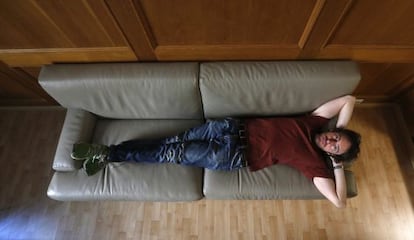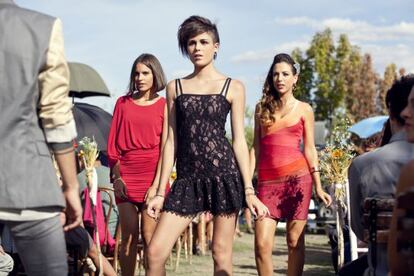"I'm always running away from myself"
Daniel Sánchez Arévalo channels Wes Anderson in 'La gran familia española'


After 16 years, Daniel Sánchez Arévalo decided to stop his psychoanalysis sessions, just like that. The slog of making films meant he couldn't keep them up any more. "I left therapy because when you're filming there's no time for anything else. And when I finished my first shoot, I discovered that I was fine. That's why I have to keep on making films," he explains.
Four features and a handful of shorts later, Sánchez Arévalo says he is capable of distancing himself from his work. "I fool around less. I finish the film and the only thing I want is to start my next project. I have milestones in my work: one is when the bosses, my producers, were excited about the result; another, when my family saw the film, and my mother called me over emotionally on the way out, crying. You calm yourself down: that's it, you've achieved it."
Sánchez Arévalo doesn't need much support. In the middle of a box office crisis, he has always enjoyed general approval. DarkBlueAlmostBlack (2006), his debut feature after devoting himself to TV scripts and shorts, took over a million euros at the box office and brought attention to his potential, winning three Goya Film Awards along with it. The risky and ambitious Gordos (2009) took 1.8 million, while light comedy Primos (2011) earned 3.5 million. His team of actor friends - Quim Gutiérrez, Raúl Arévalo and Antonio de la Torre - have gone on maturing with him. The trio appear in his new film La gran familia española (or, The great Spanish family), which follows what happens at the wedding of the youngest of one of five brothers the same evening that Spain plays Holland in the 2010 World Cup final in South Africa.
The film is set during a wedding held the same night as the 2010 World Cup final
The film, which is released on Friday, mixes the affectionate irony of Little Miss Sunshine and the quotidian bewilderment of Wes Anderson's movies. At the same time it finds room for Sánchez Arévalo's whole family. "It is the great family within La gran familia... my sister and my mother are there, my brother made the "making of," my stepfather [actor Héctor Colomé] performs, the drawings of my father [the artist Jose´ Ramón Sánchez] appear..."
The film has been selected as one of the four movies in the running to represent Spain at next year's Oscars, along with Manuel Martín Cuenca's arthouse thriller Caníbal, Santiago A. Zannou's Neo-Nazi drama Alacrán enamorado and Gracia Querejeta's drama about a troubled teen, 15 años y un día.

The idea for La gran familia... came out of trying to do something different. "When I finished Primos, I was looking for something that had nothing to do with me. I am running away from myself all the time. I suppose it was one of a bunch of ideas that I have around, that I don't pay attention to until I reach that worrying point of, 'And now what?' And from that came the idea of the wedding of a younger brother, and of a sick father who stops the celebration."
In reality the seed of the project derives from his short Traumalogía, from which the new film inherits part of its story and its meticulously planned shots. "I sought to make a comedy with feelings, with a dramatic element that, in the end, takes over the film. In my opinion, the best comedy from the last decade is The Descendants, which in reality is not a comedy."
The World Cup final was "the last element to reach the script," Sánchez Arévalo explains. "It came out of thinking about how to frame the wedding, and it is born out of my habitual love of putting obstacles in front of my main characters. You are getting married after just turning 18 and your girlfriend is pregnant, which your family is already pissed off about, and on top of that it coincides with this match."
The conversation turns to the box office. "People have stopped going to the movies and nobody is doing anything to fix it," he argues. "I admit that I am privileged. At any rate, we ought to reflect upon this change. [Director Alejandro] Amenábar said, 'I don't want to make movies that nobody sees.' He doesn't want to be a lone voice in the wilderness. Sign me up for that. I never wrote a diary, I never saw the sense in writing something for yourself. I need to share."
Tu suscripción se está usando en otro dispositivo
¿Quieres añadir otro usuario a tu suscripción?
Si continúas leyendo en este dispositivo, no se podrá leer en el otro.
FlechaTu suscripción se está usando en otro dispositivo y solo puedes acceder a EL PAÍS desde un dispositivo a la vez.
Si quieres compartir tu cuenta, cambia tu suscripción a la modalidad Premium, así podrás añadir otro usuario. Cada uno accederá con su propia cuenta de email, lo que os permitirá personalizar vuestra experiencia en EL PAÍS.
¿Tienes una suscripción de empresa? Accede aquí para contratar más cuentas.
En el caso de no saber quién está usando tu cuenta, te recomendamos cambiar tu contraseña aquí.
Si decides continuar compartiendo tu cuenta, este mensaje se mostrará en tu dispositivo y en el de la otra persona que está usando tu cuenta de forma indefinida, afectando a tu experiencia de lectura. Puedes consultar aquí los términos y condiciones de la suscripción digital.








































